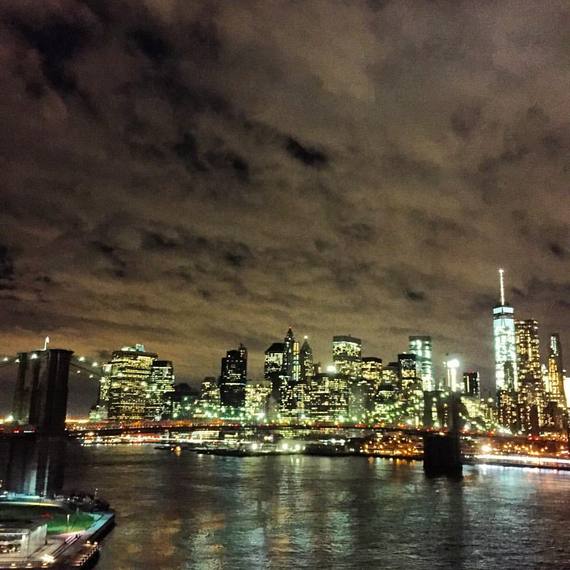Riding my bike home over the East River each night tends to raise my spirits.
I have plenty of zen moments when cycling over the Manhattan or Brooklyn Bridge, and riding all over New York City for that matter. Often times, I'll stop, snap pictures of buildings, streetscapes, trees or whatever catches my eye.
As the air rushes all around me, I marvel at the city below, a spectacular testament to man's ingenuity. The Bridges over the east river were all built well over a century ago by men. The Manhattan bridge in particular was designed by the suspension bridge engineer Leon Moisseiff. It opened in 1909.
When I ride over that Bridge, I forget the increasingly loud, abrasive pandering of the media. The offensive shouts from political campaigns steeped in zealotry, bigotry, fear: for a few moments they are muted.
I can tune out the violence in the world, the senseless crime that infects entire cities throughout the United States, it all seems so removed from my head when I pedal across the bridge into Brooklyn. Until it's not.
One evening, a few days into December 2015, I had a phone conversation with a friend about the bloodbath in San Bernardino on December 2.
"There is no silver lining," my friend said, nothing good can come of this in the aftermath.
There's no doubting that Americans live in a trigger happy society. A violent crime occurs every 27.1 seconds in America, according to the FBI. But, with San Bernardino, we seem to have crossed over into a particularly bleak, and certain to be, more divisive and reactionary chapter in this battle of how to temper this tendency to shoot at one another.
We probably won't witness any moments of national comradery, like the days following September 11. We won't be coming together, coalescing around an easily identifiable foreign enemy. The warmth and love that New Yorkers felt from Middle America during those few weeks after the towers fell, none of that will likely happen because of San Bernardino.
Instead, the media broadcasts the blatherings of a foul mouthed bully from New York who stokes the flames of an already frustrated, divided and tinderbox nation.
This country has changed since 9/11. And the high powered rifles that enabled the extremist fueled act of terrorism in California are just one ingredient to a perfect cocktail that includes all that's ugly in America today.
It really stinks that Americans have lost their ability to listen to each other. It's dangerous that we cannot find realistic common ground where an active search for solutions to the country's current state of awful might be discussed.
Listening is seen as weak, or giving in. There is no silver lining after San Bernardino. Condescension and preaching to the choir is in vogue.
Not challenging people to consider other opinions is lazy, no matter where your political tendencies lean. But preying upon people's fears, and their prejudices: that's sinful.
Since 9/11, increasingly pronounced pockets of poverty have festered throughout America. Such is the case with San Bernardino: a bankrupt shell of a community, filled with far too many jobless, hopeless, and isolated people. Those are key ingredients that hold up an invitation to radicalism.
Both the right and left spew rivers of selfish, self-righteous certitude, assigning simplistic blame for San Bernardino on one of two issues: Is it radical elements of Islam, or is it too easy to obtain firearms? Which camp of thinking do you fall into?
After San Bernardino, before any facts were even known, democratic candidates instantly blamed guns. Most republican candidates said they prayed while the lead candidate, Donald Trump went ballistic with his hateful demagoguery.
It's true that the number of homicides by guns has been declining in the United States and actually stabilized over the past few years.
According to a Pew Research Center analysis of death certificate data, collected from the Centers for Disease Control and Prevention between 1993 and 2000, the gun homicide rate dropped by nearly half, from 7.0 homicides to 3.8 homicides per 100,000 people.
Since then, the gun homicide rate has remained pretty much flat, hovering between 11,000 and 12,000 per year. But that's unacceptable.
Consider this. In many communities throughout the United States, a mentally disturbed hate filled, white extremist can just as easily go buy a weapon at the same gun shop as another U.S. consumer who has sworn allegiance to ISIS.
America remains much more violent than most of our western nation friends. And that in itself is a national disgrace.
Still, isn't it simplistic and lazy to argue that tighter gun control laws are going to solve all our violent tendencies or our bigger threat: fear, hysteria, and divisiveness.
It's amazing how prone to hysteria we Americans are. A mass shooting by a Jihadi inspired killer and suddenly that's our biggest threat.
Truth be told, since 2002, 45 Americans have died from deadly Jihadist attacks in the United States. Since 2002, 48 Americans have died from deadly Right Wing attacks according to Washington, D.C.-based think tank, New America Foundation.
Should we not be trying to drill down the conversation to the micro-community level and seek to understand what might be leading individuals down the dark path to extremism or radicalism? The carnival barking media coverage of our politicos is not helping anyone but the ratings.
Would a collective tuneout of the nonsense blasting from our TV, the blaring headlines would that reduce the hysteria and lazy reactionary politics?
Once I've crossed the bridge into Brooklyn, it's only a few minutes before I make my way home and soon enough, reminded of the sad reality that my friend is correct, there truly will be no silver lining after San Bernardino.
Freedom is supposed to be more powerful than fear, except when it isn't.

